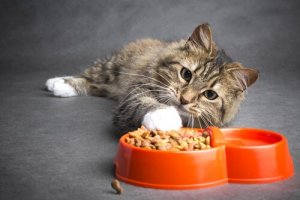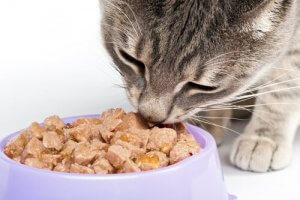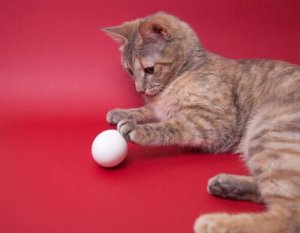Dietary Advice - Feeding Cats with Cancer

Diet is important for preventing, treating and alleviating all kinds of different health conditions. It can also be an essential aspect to keep in mind when it comes to improving the quality of life of cats with cancer or any other serious illness.
Why is a good diet so important for cats with cancer?
It’s common for animals with cancer to lose weight, either because of the physiological effects of the disease itself, or because of the treatment they’re taking. As well as fat, they may also lose muscle mass.
Not all types of cancer cause the same symptoms: a cat with cancer may or may not have an eating disorder. If there’s an eating disorder, it may take the form of:
- Anorexia: Anorexia is an abnormal lack of appetite. In animals with cancer, it may be intermittent, and caused by the course of treatment.
- Cachexia: Cachexia is the progressive loss of weight, despite the animal eating sufficient amounts of food. This is caused by a change in their metabolism, brought on by the treatment or the disease itself.
Vomiting and anorexia are more frequent in cats undergoing chemotherapy treatment than dogs. In many cases, cancer treatment is not designed to cure the patient. It’s simply meant to improve their quality of life and increase their life expectancy.
In cancer cases, food plays an important role in preventing malnutrition and the growth of new tumors.

What to feed cats with cancer?
You should never try to force an animal to eat, as it may actually have the opposite effect. If you try to force it, it will start to associate eating with negative experiences, and may even develop an aversion to food. Fortunately, there are more effective ways to feed cats with cancer:
Increase their appetite
To increase their appetite, you can offer them more palatable foods. Cats often find wet food very tasty. What’s more, their soft texture and consistency may be enough to encourage them to eat.
Heating the food up slightly so that it gives off an appetizing smell is a great way to increase their appetite.
Buy a high-quality pet food
There is a huge variety of pet foods specially designed for animals of all different ages, nutritional needs, and health conditions. Cats with cancer need a rich and balanced diet to maintain their body condition as the disease progresses. As such, it’s always best to choose high-quality pet foods.
Offer them new types of food
The novelty of a new type of food can be enough to get your cat’s attention, encouraging them to taste, and (hopefully) eat it. However, it’s still important to maintain a balanced diet. Giving your pet your leftovers isn’t an option.

Divide their food into smaller portions
Instead of filling up your cat’s bowl in the morning and leaving it to help itself, you could divide its food into smaller portions and distribute them throughout the day. This should encourage it to eat more than once.
Add supplements
As long as it won’t interfere with their treatment and is approved by your vet, you can also give your pet dietary supplements to make sure it receives all the nutrients it needs.
Reduce stress
Stress can have a huge impact on a cat’s health. The symptoms of the disease, taking medication, and going for regular check-ups at the vet will already generate a lot of stress, so it’s important to make sure you provide a quiet and relaxing home environment.
Environmental enrichment can help to reduce stress and encourage your pet to eat. This could be toys, games, treats, etc. Unless indicated otherwise by your vet, it’s best to avoid feeding your cat straight after administering its medication, so that it doesn’t start to develop negative associations with food.
Diet is important for preventing, treating and alleviating all kinds of different health conditions. It can also be an essential aspect to keep in mind when it comes to improving the quality of life of cats with cancer or any other serious illness.
Why is a good diet so important for cats with cancer?
It’s common for animals with cancer to lose weight, either because of the physiological effects of the disease itself, or because of the treatment they’re taking. As well as fat, they may also lose muscle mass.
Not all types of cancer cause the same symptoms: a cat with cancer may or may not have an eating disorder. If there’s an eating disorder, it may take the form of:
- Anorexia: Anorexia is an abnormal lack of appetite. In animals with cancer, it may be intermittent, and caused by the course of treatment.
- Cachexia: Cachexia is the progressive loss of weight, despite the animal eating sufficient amounts of food. This is caused by a change in their metabolism, brought on by the treatment or the disease itself.
Vomiting and anorexia are more frequent in cats undergoing chemotherapy treatment than dogs. In many cases, cancer treatment is not designed to cure the patient. It’s simply meant to improve their quality of life and increase their life expectancy.
In cancer cases, food plays an important role in preventing malnutrition and the growth of new tumors.

What to feed cats with cancer?
You should never try to force an animal to eat, as it may actually have the opposite effect. If you try to force it, it will start to associate eating with negative experiences, and may even develop an aversion to food. Fortunately, there are more effective ways to feed cats with cancer:
Increase their appetite
To increase their appetite, you can offer them more palatable foods. Cats often find wet food very tasty. What’s more, their soft texture and consistency may be enough to encourage them to eat.
Heating the food up slightly so that it gives off an appetizing smell is a great way to increase their appetite.
Buy a high-quality pet food
There is a huge variety of pet foods specially designed for animals of all different ages, nutritional needs, and health conditions. Cats with cancer need a rich and balanced diet to maintain their body condition as the disease progresses. As such, it’s always best to choose high-quality pet foods.
Offer them new types of food
The novelty of a new type of food can be enough to get your cat’s attention, encouraging them to taste, and (hopefully) eat it. However, it’s still important to maintain a balanced diet. Giving your pet your leftovers isn’t an option.

Divide their food into smaller portions
Instead of filling up your cat’s bowl in the morning and leaving it to help itself, you could divide its food into smaller portions and distribute them throughout the day. This should encourage it to eat more than once.
Add supplements
As long as it won’t interfere with their treatment and is approved by your vet, you can also give your pet dietary supplements to make sure it receives all the nutrients it needs.
Reduce stress
Stress can have a huge impact on a cat’s health. The symptoms of the disease, taking medication, and going for regular check-ups at the vet will already generate a lot of stress, so it’s important to make sure you provide a quiet and relaxing home environment.
Environmental enrichment can help to reduce stress and encourage your pet to eat. This could be toys, games, treats, etc. Unless indicated otherwise by your vet, it’s best to avoid feeding your cat straight after administering its medication, so that it doesn’t start to develop negative associations with food.
All cited sources were thoroughly reviewed by our team to ensure their quality, reliability, currency, and validity. The bibliography of this article was considered reliable and of academic or scientific accuracy.
- Axonveterinaria. Papel de la nutrición en el tratamiento del cáncer.
- Ateuves. Particularidades de la alimentación del paciente con cáncer, 2017.
This text is provided for informational purposes only and does not replace consultation with a professional. If in doubt, consult your specialist.








